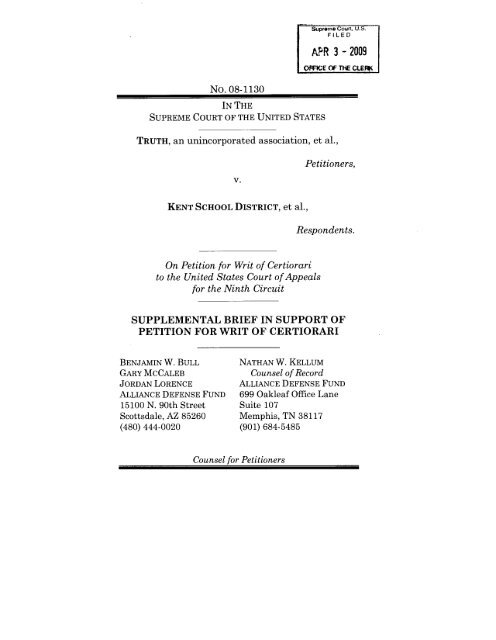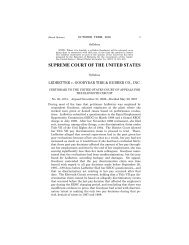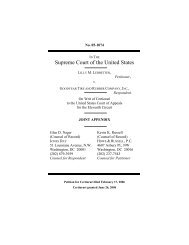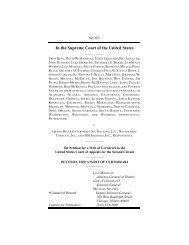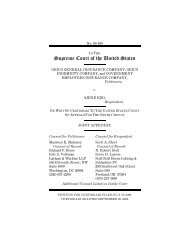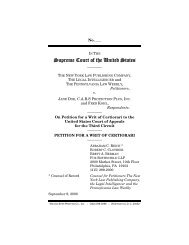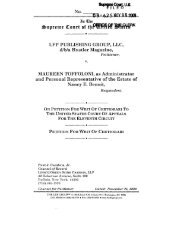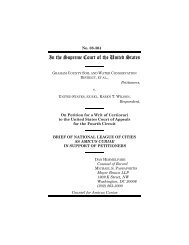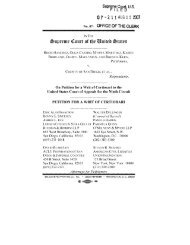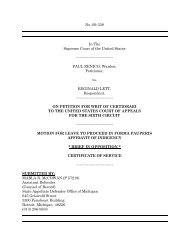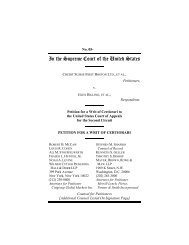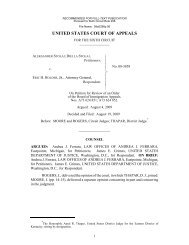Petition for Writ of Certiorari - SCOTUSblog
Petition for Writ of Certiorari - SCOTUSblog
Petition for Writ of Certiorari - SCOTUSblog
You also want an ePaper? Increase the reach of your titles
YUMPU automatically turns print PDFs into web optimized ePapers that Google loves.
FILED<br />
3- 2009<br />
OFFICE GF THE C~<br />
No. 08-1130<br />
IN THE<br />
SUPREME COURT OF THE UNITED STATES<br />
TRUTH, an unincorporated association, et al.,<br />
<strong>Petition</strong>ers,<br />
KENT SCHOOL DISTRICT, et al.,<br />
Respondents.<br />
On <strong>Petition</strong> <strong>for</strong> <strong>Writ</strong> <strong>of</strong> <strong>Certiorari</strong><br />
to the United States Court <strong>of</strong> Appeals<br />
<strong>for</strong> the Ninth Circuit<br />
SUPPLEMENTAL BRIEF IN SUPPORT OF<br />
PETITION FOR WRIT OF CERTIORARI<br />
BENJAMIN W. BULL<br />
GARY MCCALEB<br />
JORDAN LORENCE<br />
ALLIANCE DEFENSE FUND<br />
15100 N. 90th Street<br />
Scottsdale, AZ 85260<br />
(480) 444-0020<br />
NATHAN W. KELLUM<br />
Counsel <strong>of</strong> Record<br />
ALLIANCE DEFENSE FUND<br />
699 Oakleaf Office Lane<br />
Suite 107<br />
Memphis, TN 38117<br />
(901) 684-5485<br />
Counsel <strong>for</strong> <strong>Petition</strong>ers
Pursuant to Rule 15.8 <strong>of</strong> this Court,<br />
petitioners file this supplemental brief to bring to<br />
this Court’s attention a new authority that<br />
underscores the need to grant review in this case.<br />
One week after petitioners filed their petition<br />
<strong>for</strong> writ <strong>of</strong> certiorari, the Ninth Circuit rendered its<br />
decision in Christian Legal Society Chapter <strong>of</strong> the<br />
University <strong>of</strong> Cali<strong>for</strong>nia v. Kane, No. 06-15956, 2009<br />
WL 693391 (9th Cir. Mar. 17, 2009) ("Kane").1<br />
Kane, similar to the facts described in this petition,<br />
involved University <strong>of</strong> Cali<strong>for</strong>nia, Hastings College<br />
<strong>of</strong> the Law ("UC Hastings") denying Christian Legal<br />
Society ("CLS") "registered" club status, and<br />
appurtenant benefits, including access to school<br />
facilities <strong>for</strong> meetings and <strong>of</strong>fice space, eligibility <strong>for</strong><br />
funding from the school, and access to a number <strong>of</strong><br />
channels <strong>of</strong> communication on campus. Christian<br />
Legal Society Chapter <strong>of</strong> the Univ. <strong>of</strong> Cal. v. Kane,<br />
2006 WL 997217, "1 (N.D. Cal. 2006).<br />
The Kane decision is significant because the<br />
Ninth Circuit premised its holding entirely on the<br />
precedent established in Truth, confirming that<br />
Truth is not a narrow decision limited to its facts,<br />
but one that fundamentally alters the legal<br />
landscape <strong>for</strong> the expressive associational freedoms<br />
<strong>of</strong> student clubs.<br />
As a precondition <strong>for</strong> registration, UC<br />
Hastings <strong>for</strong>ces student clubs to abide by the law<br />
1 This decision is reprinted in the Appendix ("App.") attached to this<br />
supplemental brief.
2<br />
school’s non-discrimination policy. Id. at *2. The<br />
non-discrimination policy requires every registered<br />
student club to permit any student to participate,<br />
become a member, or become a leader, irrespective; <strong>of</strong><br />
that student’s beliefs and irrespective <strong>of</strong> the effect on<br />
the group. Id. at *3. Accordingly, UC Hastings<br />
concluded that the CLS Statement <strong>of</strong> Faith <strong>for</strong><br />
voting members and code <strong>of</strong> conduct requireme~ats<br />
<strong>for</strong> <strong>of</strong>ficers violated its non-discrimination policy,<br />
and denied CLS’s application <strong>for</strong> status as a<br />
registered student organization on that singular<br />
basis. Id.<br />
CLS challenged its exclusion from the law<br />
school’s <strong>for</strong>um <strong>for</strong> student organizations, claiming<br />
UC Hastings violated the group’s First Amendment<br />
right to expressive association, among other claims.<br />
Id. at *4. The district court granted summary<br />
judgment in the law school’s favor, and CLS<br />
appealed the decision. Id. at *27.<br />
One week following the oral argument <strong>for</strong> the<br />
appeal, the Ninth Circuit issued an unpublished<br />
two-sentence decision summarily rejecting the<br />
expressive association claim and affirming the<br />
district court’s ruling. App. 2a.2 For this decision,<br />
the panel cited one isolated authority, Truth v. Kent<br />
School District, 542 F.3d 634 (9th Cir. 2008), and<br />
upheld the constitutionality <strong>of</strong> the law school’s nondiscrimination<br />
policy as viewpoint neutral and<br />
reasonable. App. 2a. The Truth decision<br />
representing the binding precedent in the circui.t -<br />
2 The decision <strong>of</strong>fers little reasoning and is fittingly designated "not <strong>for</strong><br />
publication." App. la-2a.
3<br />
<strong>for</strong>eclosed any meaningful legal analysis <strong>of</strong> the<br />
expressive association claim.3<br />
The Kane decision reveals that the Truth<br />
opinion is not limited to the facts <strong>of</strong> the case. Far<br />
from it, Kane exposes the overreaching impact <strong>of</strong><br />
Truth in three distinct ways - each compounding the<br />
constitutional shortcomings that saturate the Truth<br />
decision.<br />
First, Truth’s rationale goes beyond the high<br />
school setting and expands its restrictions to cover<br />
university student groups as well - where First<br />
Amendment protection is supposed to be at its apex.<br />
See, e.g., Keyishian v. Bd. <strong>of</strong> Regents <strong>of</strong> the Univ. <strong>of</strong><br />
State <strong>of</strong>N. Y., 385 U.S. 589, 603 (1967) ("The vigilant<br />
protection <strong>of</strong> constitutional freedoms is nowhere<br />
more vital than in the community <strong>of</strong> American<br />
schools.") (citation omitted). In the Ninth Circuit,<br />
college students, along with high school students,<br />
have lost their expressive association rights.<br />
Second, while Truth involved a student club’s<br />
selection <strong>of</strong> general members, schools may use<br />
Truth’s rationale to restrict how clubs select <strong>of</strong>ficers<br />
and voting members. These positions must now be<br />
open to non-adherents.<br />
3 One <strong>of</strong> the three judges on the Kane panel, Judge Bea, wrote an opinion<br />
dissenting from the Ninth Circuit’s denial <strong>of</strong> en banc review in Truth. In<br />
this opinion, Judge Bea strongly criticized the Truth panel’s<br />
misapplication <strong>of</strong> this Court’s expressive association jurisprudence. Truth<br />
v. Kent Sch. Dist., 551 F.3d 850, 855-57 (9th Cir. 2008) (Bea, J.,<br />
dissenting from denial <strong>of</strong> rehearing en banc). But despite his misgivings<br />
about the analysis in Truth, Judge Bea was compelled to adhere to Truth<br />
as binding authority in the Ninth Circuit.
4<br />
Finally, as illustrated in Kane, Truth’s<br />
rationale allows schools to demand every student<br />
club permit any student to join and/or lead the club,<br />
no matter how significantly that student might alter<br />
the club’s identity and message. Thus, a school may<br />
<strong>for</strong>ce the Young Democrats Club to allow a<br />
Republican to be its president or require the<br />
vegetarian club to grant voting privileges to meateaters.<br />
There could be no greater intrusion on. a<br />
group’s expressive association; yet, as long as a<br />
school <strong>for</strong>ces every student club to accept all comers,<br />
the policy is per se viewpoint-neutral and reasonable<br />
- and hence constitutional - under the flawed legal<br />
framework <strong>for</strong>med by the Ninth Circuit in Truth.<br />
Kane demonstrates that the Truth decision is<br />
not a one-time aberration, but a ruling that signifies<br />
lasting and adverse consequences to the right to<br />
expressive association in various contexts. A~ad,<br />
because this result conflicts with holdings <strong>of</strong> tlhis<br />
Court, and other circuits, Truth’s petition <strong>for</strong> writ <strong>of</strong><br />
certiorari ought to be granted.
5<br />
Respectfully Submitted,<br />
Benjamin W. Bull, Esq.<br />
Gary McCaleb, Esq.<br />
Jordan Lorence, Esq.<br />
ALLIANCE DEFENSE FUND<br />
15100 N. 90th Street<br />
Scottsdale, AZ 85260<br />
(480) 444-0020<br />
Robert H. Tyler, Esq.<br />
Jennifer L. Monk, Esq.<br />
ADVOCATES FOR FAITH<br />
AND FREEDOM<br />
24910 Las Brisas Road,<br />
Suite 110<br />
Murrieta, CA 92592<br />
(951) 304-7583<br />
Nathan W. Kellum, Esq.<br />
(counsel <strong>of</strong> record)<br />
ALLIANCE DEFENSE FUND<br />
699 Oakleaf Office Lane<br />
Suite 107<br />
Memphis, TN 38117<br />
(901) 684-5485<br />
Timothy Chandler, Esq.<br />
ALLIANCE DEFENSE FUND<br />
101 Parkshore Drive,<br />
Suite 100<br />
Folsom, CA 95630<br />
(916) 932-2850<br />
Keith A. Kemper, Esq.<br />
ELLIS, LI & MCKINSTRY<br />
Two Union Square<br />
Seattle, WA 98101<br />
(206) 682-0565


